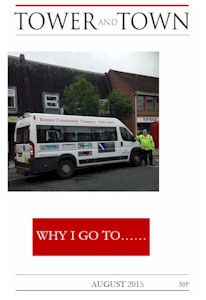

Tower and Town, August 2015 (view the full edition) (view the full edition)Responding To EmergenciesIn recent times I've been asked to present discussion papers to a remarkable body - the Council of ex-Heads of State and Government. Bill Clinton is a member. Two years ago, in Bahrain, I wrote a piece on 'The Risks of Sectarianism', which was published by the United Nations Press as part of a composite volume. At the council's recent meeting in Wales, one of the two themes considered was 'Responses to Emergencies'. With great help from the Wiltshire teams, I submitted a paper on contingencies for dealing with emergencies (pandemics, flooding, terrorism, etc.) in this county. The results were reassuring. The most interesting aspect of the conference was, however, the presence of Viktor Zubkov, the former Prime Minister of Russia and Viktor Yushenko, the former President of the Ukraine. In public, they knocked bits off each other. It was depressing to hear the language of the Cold War revived. Hopefully, there was more amenable contact in private. It was interesting to hear the Russian case for their actions in Ukraine, which is stronger than Western media and politicians give credit for. It is claimed that a legitimately elected Government was overthrown by force, with the connivance of western powers. The new Government banned Russian as an official language on the second day it was in power, which, since at least 40% of the population was Russian-speaking must be regarded as a provocative act. Thus the Russian-speaking Eastern provinces and The Crimea chose to opt out of the fait accompli. They also cite the disastrous Western intervention in Iraq and Libya and the imposing of self-determination on Kosovo. Be that as it may, the situation in the Eastern Ukraine is clearly fraught. The Minsk Agreement was much referred to. This was negotiated between the leaders of Russia, Ukraine, France and Germany, together with the leaders of the rebel provinces, last February. While this was a good basis for further negotiations that have not so far happened, publicly, at least, like many such concordats, it contained potentially contradictory detail. It's not always easy to reconcile the concept of 'self-determination' with that of 'territorial integrity', for example. The former Irish Prime Minister, Bertie Ahearn (who knows a deal about peace processes ), suggested that the two sides might usefully work out the detail together. This was a sound suggestion. Not only would it ensure that they continued to speak, it would also ensure that whatever divided them could be addressed directly. We can but hope that this will happen. The danger of the current dispute is that the nations are walking unwittingly back into a cold war - and that a cold war can lead to a hot war. The lesson of 1914 should teach us that where there are issues of nationalism combined with territorial disputes, the situation is dangerous indeed, capable of spreading into a wider conflict. For this vital reason, it is important to maintain dialogue, particularly under the auspices of neutral and experienced bodies like the one I just attended. As a result of participating in such a dialogue, I also realised the necessity of keeping Russia within the concert of nations. 'War', said von Clausewitz, 'is the continuation of politics by other means.' Let's pray otherwise. Nick Fogg |